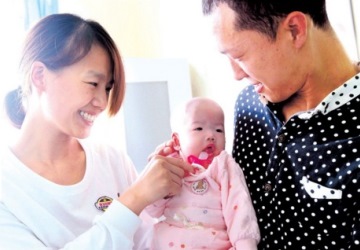Usted está aquí
Cord Blood Transplant Corrects Very Early Onset Irritable Bowel Disease
 The baby girl Zhao Jiaxin was the first child in China to receive a cord blood transplant as a cure for a genetic form of irritable bowel disease that is often lethal to newborns.
The baby girl Zhao Jiaxin was the first child in China to receive a cord blood transplant as a cure for a genetic form of irritable bowel disease that is often lethal to newborns.
Born in early 2015, baby Zhao began suffering from diarrhea and fever when she was just 8 days old. These same symptoms had led to the death of her older sister at age 5 months. “We feared so much that we might lose her, too,” said her mother Ji Jiannan. Zhao’s father, Zhao Mingwei, said: “Our first daughter succumbed to the disease, so when Yuanyuan (Zhao’s nickname) started showing the same symptoms when she was just a week old, we were terrified.”
Zhao‘s family lives in the Chinese province of Henan. After failing to find help at local clinics, her parents took her to the Children’s Hospital of Fudan University in Shanghai. It was there that genetic testing revealed that Zhao had a Very Early Onset form of Irritable Bowel Disease (VEO-IBS) that is caused by an inherited genetic mutation. A deficiency in the gene for the immunosuppressive cytokine interleukin-10 leads to severe dysregulation of the immune system in the intestines. First reported1 in 2009, children with VEO-IBS from IL10RA immune deficiency are not only severely malnourished but often have intestinal abscesses and fistulas.
“The only effective treatment is a stem cell transplant,” explained Huang Ying, MD PhD, the director of the digestive disease department at Children’s Hospital of Fudan University, in an interview with Shanghai Daily. “It can help to repair the genetic deformity and control the symptoms of the disease,” she said.
Baby Zhao became the first of 9 patients over 2 years to receive cord blood transplants at Children’s Hospital of Fudan University for VEO-IBS with IL10RA immune deficiency2. The patients ranged in age from 6 to 43 months and in weight from 3 to 10.4 kg. The transplants were performed with reduced intensity chemotherapy conditioning, so there was less toxicity for infant patients already suffering from malnutrition and infections of the intestines. Patients experienced normal stools within 1 to 3 months after engraftment of the transplant.
Chinese newspapers covered the story when baby Zhao went home in Nov. 2015. Her happy mother exclaimed, “I remember when she was 100 days old, she was skinny like a skeleton. Now look at her: She’s almost got a puffy face.”
The team at Children’s Hospital of Fudan University submitted a paper2 about their first group of patients in Sept. 2017 and it was published in May 2018. The paper includes an excellent video abstract in English. Although VEO-IBS is a rare condition, in the Shanghai area the incidence has increased 12-fold3 over the decade from 2000 to 2010. The team at Children’s Hospital of Fudan University has the most successful transplants for VEO-IBS so far and they continue to study the genetic variations that contribute to this condition.
References
- Glocker E-O et al. Inflammatory Bowel Disease and Mutations Affecting the Interleukin-10 Receptor. NEJM 2009; 361:2033-2045
- Peng K, .... Zhai X-W, Huang Y. Umbilical Cord Blood Transplantation Corrects Very Early-Onset Inflammatory Bowel Disease in Chinese Patients With IL10RA-Associated Immune Deficiency. Inflammatory Bowel Diseases. 2018; 24(7):1416–1427.
- Wang X-Q, et al. Inflammatory Bowel Disease in Chinese Children: A Multicenter Analysis Over a Decade from Shanghai. Inflammatory Bowel Diseases. 2013; 19(2):423–428.


